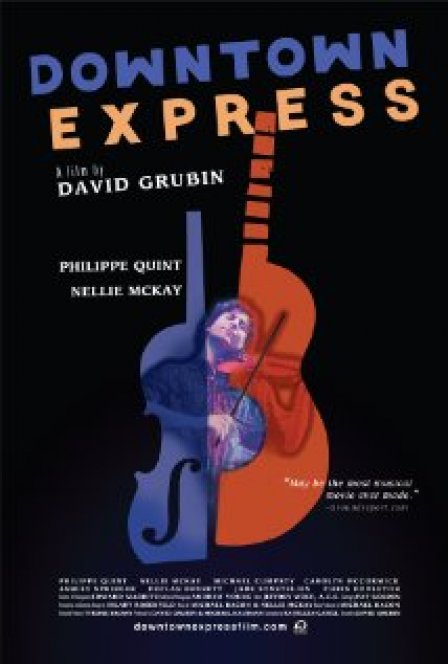Music is everywhere in New York City. Downtown Express, the tale of a young Russian-American classical violinist tempted to explore other musical avenues, aims to evoke the daily rhythms of the working musicians who fill the city’s public and private places with song. The film is so successful at achieving this goal that it gets by on warm humor, ramshackle charm, and the strength of its closely observed milieu — until, inevitably, it must crank the creaky gears of its plot.
Sasha (acclaimed violinist Philippe Quint) gigs everywhere — subway stations and trains, restaurants, retirement homes — with his father (Michael Cumpsty) and cousin (Ashley Springer). They call themselves the “Uneque String Quartet,” which is unique because there are only three of them. When he isn’t playing with his family, Sasha is rehearsing for a recital with his Juilliard instructor/pianist (Carolyn McCormick). At an audition to become an officially-sanctioned MTA performer, Sasha becomes fascinated by a cabaret-rock band called Downtown Express, and more specifically its leader, Ramona (Nellie McKay). He crashes their next gig, and soon he’s adding his violin to their sound.
If this is starting to sound a bit like Once, well, it is and it isn’t. Rather than asking, as in that film, “Will these two people fall in love while making music together?” Downtown Express asks, “Will this person choose the music of his family or the music of his adopted home?” Updating the central conflict of The Jazz Singer is an inadvisable but not quite hopeless task. For us to believe that a musician as fervent as Sasha would ditch an important recital, he must be lured by an extra-musical temptation or else by music that is irresistibly seductive. Ramona is more cipher than siren, though, and the film’s placement of her modest, introspective music (by McKay and Michael Bacon) in contrast to the grand passion of Tchaikovsky undermines the entire premise.
Downtown Express surrounds its musician stars with a crack cast of screen and stage vets. A witty, complex, sometimes-caustically political singer-songwriter, McKay can also act (as she demonstrated in the 2006 stage revival of The Threepenny Opera), but here she flounders in an ill-defined role that would challenge any performer. She seems most uncomfortable when she’s required to stand back and be charmed by Sasha’s impressions of Elvis Presely and Michael Jackson, a bit of male grandstanding one suspects the real McKay would challenge, tear down, one-up — anything but passively admire. Fortunately, Quint (who’d never acted before) is a natural, affable screen presence. And the hole left by the underdevelopment of the primary romance is filled by a secondary romance between Sasha’s teacher and his father, enacted with winning chemistry by McCormack and Cumpsty.
Director David Grubin is a prolific documentarian, and he brings a sharp eye to his first fictional feature. The location shooting captures the details of New York so precisely — the clever graffiti, the cramped crash pads, the sweaty clubs — that it conjures a vibrant, lived-in world. It’s one thing to notice textures like the tiles of subway stations or the herringbone pattern of the wood on the Coney Island boardwalk, but it’s another to make them come alive on screen. This visual atmosphere complements the film’s aural evocation of the city. What comes through most strongly in Downtown Express is the kinship felt among musicians, expressed through Sasha’s smile whenever he hears a cappella harmonizers on the subway or kids thumping on recycling bins on a street corner. The closing credits roll over a montage of some of New York’s veritable UN of public musicians, underscoring a triumph of mood and spirit that partially excuses some narrative failings.

